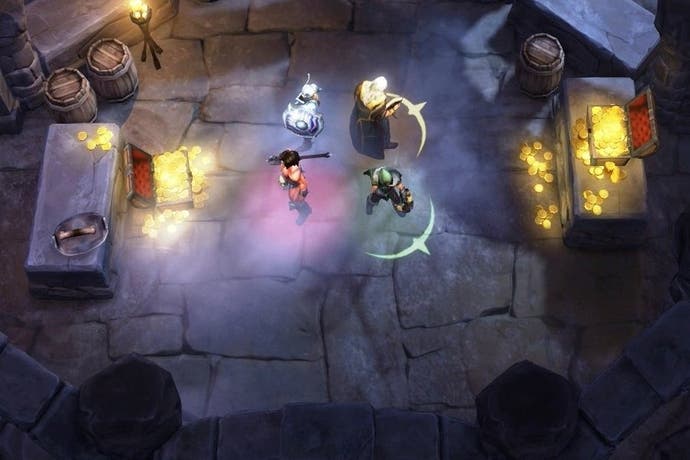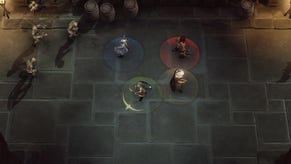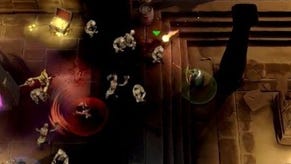Gauntlet review
Tough glove.
Gauntlet's a game about shooting monsters, but it's also a game about shooting food. And that's weird really, isn't it? Because shooting (or whacking) food doesn't ultimately seem to help anyone. The hectic, enemy-riddled mazes this legendary dungeon crawler throws you into can be terrifying, exhausting places, and no matter how good your teamwork is, both you and your allies are going to need a health top-up every now and then as you fight your way to the exit. Shoot the food, though, and you're shooting the health top-up. Why did you shoot the food, you noob?
In truth, I'd argue that part of the reason Gauntlet's so fondly remembered after all these years is precisely because you can shoot the food - and because this arcade classic hinges on one of the darkest insights into human psychology that you're likely to find in a video game that also features an elf. Sometimes, Gauntlet whispers, it's not enough to just win in a team sport. Sometimes, it really helps if everyone else on your winning team also loses a little bit. It's us against them, but can't it be us against us on the rare occasions that the opportunity presents itself? If you're complaining that all the noobs are shooting the food, is it possible - just possible - that the real noob in the equation is you?
Arrowhead's Gauntlet reboot celebrates the bitter, vindictive, and needlessly spiteful side of this fantasy slash-'em-up with easy grace. You can shoot the food so your allies won't get healed, and then you can loot their corpses when they eventually drop dead because they couldn't get healed. In between all that, of course, you can also hang back, letting your fellow party-members take on the mobs and the grasping throngs for you. You can hang back and vacuum up the loot while they're making the world a safer place. Finally, once they return to you, bloody but only partially bowed, you can shoot their food before they get to it and imagine the massed shoulder sagging that ensues both here and on the post-level results screen where you see who got what.
Or you can behave much more pleasantly, of course, pitching in with the teamwork that's genuinely required if you want to make inroads on the harder difficulty settings. Gauntlet will have you however you choose to behave - but there are enough indicators, quietly sprinkled through its design, that it still wants to tempt you to the dark side every now and then.
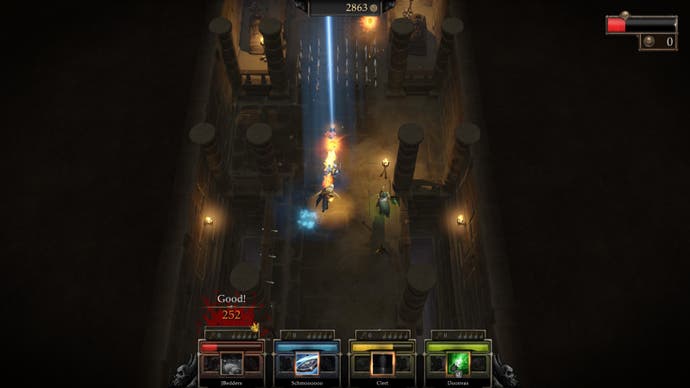
Despite the annoyances and griefing it causes, this moral flexibility is probably a good thing, because while Arrowhead has preserved the secret heart of Gauntlet with elegance and wit, elsewhere it has failed to offer many ideas that build on the basic foundations in interesting ways. The end result is a game that's often caught between attempting too little and attempting too much.
The four classic Gauntlet classes return, but the developer's struggled to make them truly memorable. The Warrior has a neat spinning attack, the Valkyrie can do a Captain America shield-fling and the Elf can summon bombs or snipe or turn the whole thing into a twin-stick shooter, but these stand-out treats are thrown in alongside other character-specific moves that are useful but bring few genuine nuances to the archetypes. At least the developer is having fun with the Wizard. He's inevitably where the creators of Magicka feel most at home, as he's given the ability to build nine simple offensive spells from two-part combinations of three different elements.
It's a little too tempting to fall back on the standard fireball if you're Wizarding on easy settings, but you should never play Gauntlet on easy settings for long, just as you should never really play it alone. Cranked up to hard at least, and with three team-mates joining in either locally or online, the Wizard will need to understand every inch of his magical arsenal, from area-attack freezes to arcing electricity and a sort of braided-plasma teleporting headbutt that comes with an agonising cooldown. The Wizard's got a bit of a learning curve compared to the rest of the gang but, for my money, he's the most entertaining class because of this.
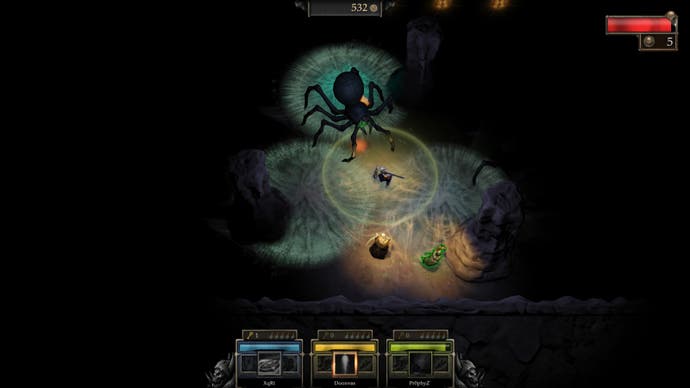
Arrowhead has struggled a bit with the environments, too. The lighting's lovely and there's still some good pillaging to be had, but the fantasy settings - temple, caves, fiery pits - are a touch too generic, and the gimmicks thrown in often fall flat as you cycle through standard levels, endurance lock-ins and areas with a bit of a twist. The twists are fine in principle: the figure of death intermittently pursues you through some early stages, for example, making the most of a few awkward chicanes, while other dungeons might turn the lights out or task you with pinging between crank handles that send streams of lava burbling past ancient machinery. And yet - like a handful of dull end-of-chapter bosses - this stuff can feel redundant in a game that's so clearly focused on having you chug through masses of enemies in one room before you chug through masses of enemies in the next room.
Gauntlet's a little too straight-ahead in its focus, too simple in its pleasures, to make pace-changers seem like anything more than adornments, and the best moments are still the frantic hunts for that missing key as the monsters mass behind a locked door, the race to snatch all the gold that's flung around a new area, and those last-millisecond victories when you destroy the final enemy spawner seconds before you're totally overwhelmed. (The emphasis on spawners and locked doors, incidentally, serves as a reminder that Gauntlet is not really designed to be enjoyed without friends along for the ride.)
I feel for Arrowhead at moments like these. The developer has clearly put Gauntlet together with real heart, and there's been a palpable effort to make the environments warrenous and interesting - yet the original game managed to create so much more excitement and mystery with endless dungeons that looked like the inside of primary school gymnasiums. It might have been better to just hand the entirety of the level design over to an algorithm and a bunch of tiles here, rather than mixing procedural stuff in with pre-set sections and trying to vary the action.
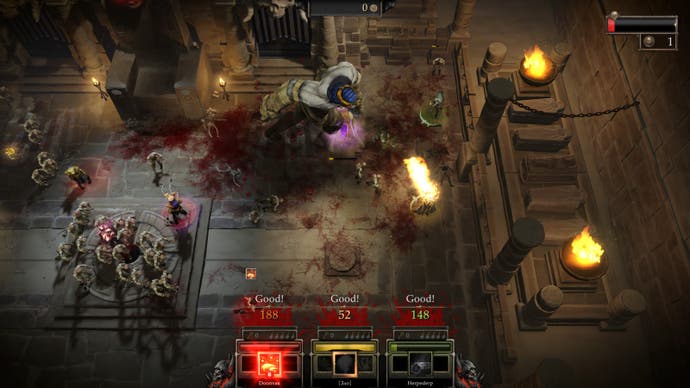
Beyond all this are some rough edges - a shared camera that struggles when party-members head in different directions, no option for keybinding on mouse and keyboard, a user interface that obscures the bottom of the playing field - and a gaggle of voguish ideas that range from the inspired to the unnecessary. Relics are great: a bunch of equipable - and upgradeable - trinkets you can buy with all your loot that give you special potion-powered abilities, such as double-speed movement with a flaming twist, or a summoned gem that draws aggro.
Masteries, meanwhile, feel less successful, rewarding you with incremental stat upgrades regarding everything from damage dealt against certain enemies to loot collection, as you perform simple tasks like shooting on-screen furniture or dropping the golden crown that bounces back and forth between the most energetic hoarders. Masteries look great laid out on the menu screen, and you occasionally unlock a welcome wrinkle for an old skill, but too often they merely add a grindiness that Gauntlet's stripped-back design doesn't really require. Levelling isn't needed here because, pointy hats and pointier ears aside, classic Gauntlet isn't actually an RPG. It's an arcade game. It's a sport.
Still, despite the missteps, Arrowhead's Gauntlet is a dungeon-crawler that understands the action's at its most thrilling when four players are piled in together, helping each other through the fight - and giving each other a hard time when they think that nobody's looking. Matchmaking is fairly rudimentary and you can't join a game in progress, but the basic implementation of it works, and for the time being there are lots of people to play with. If only there was voice or text chat so you could lay down some rules regarding food-shooting before you got stuck into the brawling.
Sadly, the biggest problem with this whole package may be that Arrowhead has already made a truly great Gauntlet tribute anyway, and it was Magicka. There was a game with the freedom to choose its own first principles, while still having Gauntlet's mean-spirited playfulness baked into it. The difference, I suspect, is between being creatively inspired by the spirit and ethos of a legendary design, and being cast as a kind of well-intentioned caretaker.
